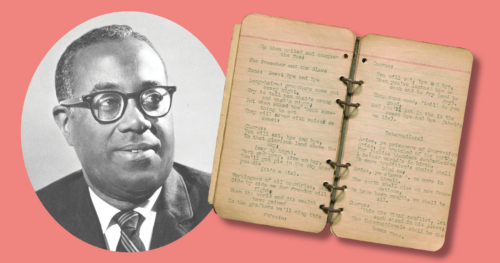‘Poor has become a four-letter word,’ opening speaker at Matthew 25 Summit tells capacity crowd
February 29, 2024

The Rev. Dr. Liz Theoharis delivers the opening plenary
during the Matthew 25 Summit. (Photo by Rich Copley)
A powerful sermon by the Rev. Hodari Williams, team leader of New Life Presbyterian Church in South Fulton, Georgia, deftly set the stage for the Rev. Dr. Liz Theoharis, who brought conference-goers to their feet with her opening plenary on the first day of the historic Matthew 25 Summit.
Theoharis, executive director of the Kairos Center for Religions, Rights, and Social Justice at Union Theological Seminary in the City of New York and co-chair of the Poor People’s Campaign: A National Call for Moral Revival with the Rev. Dr. William J. Barber II, is an ordained minister in the Presbyterian Church (U.S.A.) and teaches at Union Theological Seminary.
After Williams poignantly compelled worshipers to see and to value those who are invisible in society, Theoharis rendered the invisible — the poor — manifestly visible through her use of video, her skillful exegesis of Matthew 25 and her bold call to organize to fight and end poverty.
Opening her address by invoking the Rev. Dr. Martin Luther King Jr. “in one of his hometowns just a day after his birthday,” Theoharis cited King’s final work, “Where Do We Go from Here?”
“’The prescription for the cure rests with the accurate diagnosis of the disease,’” she said, quoting King. “‘A people who began a national life inspired by a vision of a society of brotherhood can redeem itself. But redemption can come only through a humble acknowledgment of guilt and an honest knowledge of self.’ We owe it to [King] and to ourselves to take these words seriously.”
After painting a bleak but realistic portrait of the 45 million people currently experiencing hunger and food insecurity in America Theoharis asserted that policymakers in Washington and so many states continue to legislate as if inequality weren’t an emergency.
“When it comes to accurately diagnosing what ails America, let alone prescribing a cure,” she said, “our nation falls short … ‘Poor’ has become a four-letter word.”
Then, turning to the Bible, which she called “the only [media source] that has something good to say about the poor,” and addressing her particular audience of Matthew 25 Presbyterians, she said, “As a people, too often we believe we can claim to be Christian just by going to church on Sunday rather than committing ourselves to the issues to which Jesus committed himself.”

The Rev. Denise Anderson, director of Compassion, Peace &
Justice in the Presbyterian Mission Agency, introduces the
Matthew 25 Summit’s first plenary speaker, the Rev. Dr. Liz
Theoharis. (Photo by Rich Copley)
As Theoharis began to unpack the Scripture that served as the inspiration for the Summit, she corrected a common misperception.
“The first thing we get wrong about Matthew 25 is that it’s a message for individuals,” she said. “Matthew 25 tells us that Jesus is speaking to the nation, perhaps to those with the political and economic power to meet the needs of the people. … The message of Matthew 25 is when a nation acts, the whole society flourishes.”
Theoharis practices what she preaches. As co-chair of the Poor People’s Campaign: A National Call for Moral Revival, she and Barber have helped to build a movement that seeks to revive the message of the original campaign, which declared that racism, militarism and poverty are interconnected evils and must be fought together — and that the poor and dispossessed must lead that fight.
“When we build a movement of those considered expendable, we can end poverty,” she said. “If we refuse to organize our society, our nation, around the needs of the poor, poverty and want will never be banished and we will have abandoned Jesus.”
As she continued to ground her thesis in both Scripture and the actions of the early Church, Theoharis said that organizing a movement today very much looks like the agency of those early Christians and their acts of civil disobedience.
“Both back then and today, we have to figure out how to meet each other’s needs and keep on fighting,” she said. “If we are to follow God’s economy, there is no poverty, there is no hunger, there is no homelessness. The absence of poverty isn’t just an absence of poverty, but the presence of justice.”
Theoharis also invited attendees to visit the website of the Poor People’s Campaign to learn more about and take part in nationwide rallies on March 2 and a June 15 event in Washington, D.C.
Emily Enders Odom, Associate Director of Mission Communications, Presbyterian Mission Agency
Today’s Focus: Rev. Dr. Liz Theoharis, opening speaker at the Matthew 25 Summit
Let us join in prayer for:
PC(USA) Agencies’ Staff
Katie Carter, Manager I, Faith Based Investing, EDO, Presbyterian Mission Agency
Laura Caruthers, Client Specialist II, Presbyterian Foundation
Let us pray
Gracious God, we give thanks that you draw us and all Creation toward your perfect will. You work through us to give newness of life to neighbors down the street and neighbors around the globe. We pray for ministries that bring your message of reconciling love to our broken world. Amen.











